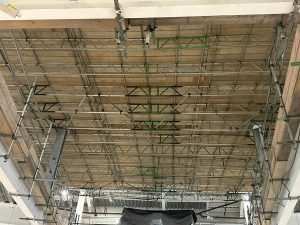Scaffolding is a critical component in construction and renovation projects, providing the necessary support for workers and materials. Ensuring the safety and stability of scaffolding structures is paramount, as any failure can lead to severe accidents and project delays.
Regular inspections and maintenance are essential practices that uphold the integrity of scaffolding, ensuring it remains safe and functional throughout its use.
Without regular checks, scaffolding can deteriorate unnoticed, leading to dangerous situations. Routine inspections help identify potential issues before they become serious problems, allowing for timely repairs and adjustments.
This proactive approach not only enhances safety but also ensures that the scaffolding system performs optimally, supporting efficient and effective project execution.
Ensuring Worker Safety
Regular scaffolding inspections play a crucial role in preventing accidents on construction sites. By identifying and addressing potential hazards, inspections ensure that the scaffolding remains secure and safe for workers.
Common issues such as loose connections, damaged components, or unstable bases can be detected early through systematic checks, reducing the risk of falls and other accidents.
Moreover, thorough inspections contribute to a safer working environment, fostering confidence among workers.
When workers know that the scaffolding they are using is regularly checked and maintained, they can focus on their tasks without fear of unexpected failures.
This not only improves safety but also enhances productivity, as workers can perform their duties more efficiently when they feel secure.
Legal and Regulatory Compliance
Adhering to legal and regulatory standards is a fundamental aspect of scaffolding maintenance. Various laws and guidelines dictate the requirements for scaffolding safety, including regular inspections and maintenance. Compliance with these standards is not only a legal obligation but also a crucial element in protecting workers and avoiding potential legal repercussions.
Failure to comply with these regulations can result in significant penalties for construction companies, including fines and work stoppages. Additionally, non-compliance can lead to serious accidents, which can have legal and financial ramifications.
Regular inspections ensure that scaffolding meets all necessary safety standards, safeguarding the company from legal issues and enhancing overall project safety.
Prolonging Scaffold Life
Regular maintenance is vital for prolonging the lifespan of scaffolding. Just like any other piece of equipment, scaffolding is subject to wear and tear over time.
Through regular inspections and maintenance, any signs of deterioration can be addressed promptly, preventing minor issues from escalating into major problems that require costly replacements.
By investing in routine maintenance, construction companies can significantly reduce the need for frequent scaffolding replacements. This not only saves money in the long run but also ensures that the scaffolding remains reliable and safe for use over multiple projects.
Well-maintained scaffolding is a cost-effective solution that supports long-term project planning and budgeting.
Enhancing Project Efficiency
Well-maintained scaffolding directly contributes to the efficiency of construction projects. When scaffolding is in good condition, it provides a stable and reliable platform for workers, facilitating smooth and uninterrupted work processes.
Regular inspections and maintenance help avoid unexpected breakdowns that can cause delays and disrupt project timelines.
Case studies have shown that projects utilising regularly maintained scaffolding experience fewer interruptions and higher productivity levels. For instance, a project in London saw a 20% improvement in efficiency after implementing a rigorous scaffolding maintenance programme.
Such examples highlight the tangible benefits of investing in regular inspections and upkeep, proving that it is a worthwhile endeavour for any construction project.
Identifying and Addressing Wear and Tear
Scaffolding is constantly exposed to various elements and stresses that can cause wear and tear. Regular inspections are essential for identifying common signs of damage, such as rust, corrosion, or structural deformities. Early detection allows for immediate action, preventing further deterioration and ensuring the scaffolding remains safe and functional.
Effective maintenance procedures involve cleaning, lubricating, and repairing any damaged parts. This comprehensive approach ensures that all aspects of the scaffolding system are addressed, maintaining its integrity and performance.
By routinely inspecting and maintaining scaffolding, construction companies can ensure the safety and efficiency of their operations, ultimately leading to better project outcomes.
Protecting Company Reputation
A strong safety record is invaluable for any construction company, and regular scaffolding inspections play a significant role in maintaining this reputation. Clients and stakeholders are more likely to trust and engage with companies that prioritise safety and adhere to high standards of maintenance.
Regular inspections demonstrate a commitment to safety, enhancing the company’s credibility and marketability.
Additionally, a good safety record can lead to repeat business and positive referrals.
Clients who are satisfied with the safety standards of a company are more likely to return for future projects and recommend the company to others. Thus, regular scaffolding inspections not only protect the well-being of workers but also bolster the company’s reputation and business prospects.
Conclusion
In conclusion, regular scaffolding inspections and maintenance are critical for ensuring worker safety, legal compliance, and project efficiency.
These practices help identify and address wear and tear, prolong the lifespan of scaffolding, and protect the company’s reputation.
The benefits of regular inspections are clear, making them an essential part of any construction project.
Incorporating regular scaffolding checks into project planning is a proactive step that can save time, money, and lives.
By committing to thorough inspections and maintenance, construction companies can create a safer, more efficient working environment that benefits everyone involved.
Ensuring the integrity of scaffolding through regular care is not just a best practice but a necessity for successful and safe construction projects.
If you are involved in a construction project and want to ensure the safety and efficiency of your scaffolding, contact KMS Scaffolding Ltd today.





